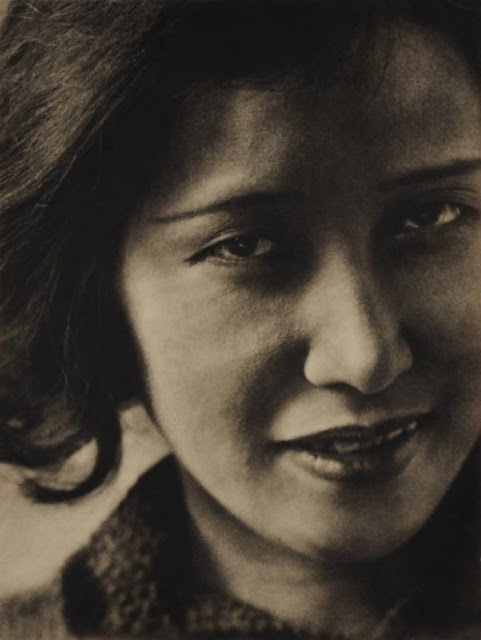 |
| Title unknown (Model F.) Bromoil print, 1931 |
There is no more electrifying experience in the bookstore than opening a book about which you know nothing and being magnetically mesmerized by its pages.
This often happens with photography books, with authors of whom one was completely unaware until a moment before, and who – once purchased – become lifelong companions.
It happened to me with Yosuzo Nojima's book.
His photography is my fifth choice.
In those years in Japan there was a revolutionary phase of transition from centuries of tradition towards an opening to the arts and culture of the West.
In the 1920s, Nojima was part of the shirakaba-ha, a literary and artistic movement that fed on Western influences; in 1928 he became a member of the Japan Photographic Society.
 |
| Koji Nishigori. “Yasuzo Nojima” Bromoil print, 1930 |
After having been part, like many Japanese photographers at the time, of the pictorialist movement and art photography in its first photographic phase (1915-1923), he will abandon it to give life to his "modernist" period, in the 1930s , considered its artistic peak.
Ditch the dichromate gum and switch to bromoil, influenced by oil paint.
“The photographer obtained his bromoil prints from normal gelatin silver prints: after “bleaching” these, with a brush he wouls apply oily inks which would only seep into the darkest areas of the picture.” (Chiara Dall'Olio)
The Japanese word for photography is “shanshin” which means “reproducing reality”. But portraits from the 1930s have something beyond simple reality.
He chooses a few models and portrays them continuously, in different shooting sessions. Like the famous series by Model F.
Nojima himself once wrote that the photographer had to use the shadow of light, shape and style to create an expressive aesthetic. He was convinced that in the portraits of his models his individuality and emotion should emerge more than that of the women who posed for him.
 |
“Miss Chikako Hosokawa” Bromoil print, 1932 |
But the feeling is quite different.
Most of the time the women portrayed look decisively into the lens, but in the series of F. her gaze escapes, escapes ours.
Yet, I still remember the first time I opened the pages of his book and saw these portraits: I found them irresistible, unique, magnetic.
Even if our eyes do not meet F.'s eyes, one has the feeling of being able to enter her mind, her heart, with an empathy that I have rarely experienced when looking at other photographic portraits.
As if the shadow of the light revealed an interior dimension which is impossible to escape; and F. would call us to try to hear what makes her so melancholy and silent.
Distant, but at the same time a few inches from her waning breath.
 |
Unknown title (Model F.) Bromoil print, 1931 |
I have observed hundreds of portraits over the years, and many of them are splendid and unforgettable.
Despite this, his portraits continue to exert an irrepressible fascination on me, unlike anything I've seen.
They have a mystery that is difficult to put into words – in this Nojima is profoundly “Japanese”, as Chiara Dall'Olio writes in her beautiful introduction to the book.
His faces are there, not looking at us yet we feel their presence in every fiber of ours.
Yasuzo Yojima is famous in Japan but almost unknown in Italy.
I hope that his portraits can accompany you too, as they did with me.
Beauty must always be shared.
“We find beauty not in the thing itself but in the patterns of shadows, the light and the darkness, that one thing against another creates.”
 |
| “Miss Chikako Hosokawa”. Bromoil print, 1932 |


I'm always excited when read about Japanese.
ReplyDeleteUnique. Mystery. Sentimental. These are my feelings when read about Yasuzo Nojima.
Interesting and give different angle in my mind about photography.
Thanks a lot 🙏
DeleteIt's nice to know more photographers from Asia
ReplyDeleteMy pleasure 😊
DeleteBeauty is subjective...not all beauty must or can be shared...some must keep personal...must keep secret...to enjoy personally...just for the photograpers' eyes only😊🤗😉
ReplyDeleteMaybe, but I like share 😊😊
Delete